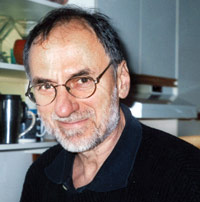Working for the Environment - Then and Now
From the Fall 2007 issue of Nexus.

Alan Levy '70 |
Environmental awareness is everywhere it seems. From local city halls to grocery stores, from G8 summits to grass-roots activism, it appears that green consciousness is stronger than ever before. Is it a new, sustainable movement - or is it like the old song goes, 'everything old is new again'?
Alumnus Alan Levy '70, sees the changes - and the similarities - from his early start in environmental affairs 35 years ago, a time when very few lawyers were making a living that way, to today when it's not so unusual any more to see lawyers with environment-focused practices.
Levy says that while the "green movement" has become more mainstream today, there always was environmental awareness. "It was emerging as a movement in the late sixties and seventies. People were recycling, interested in health foods and aware of pollution. The issue was just that law hadn't caught up with the movement," he says.
Fortunately, Levy met a small group of law students at U of T who were also interested in the environment. In addition to their regular course of study, they made the environment their extracurricular priority.
"When I was at school toward the end of my third year, there was a group of people - not just third-year students - who created the Environmental Law Association. That began in 1970. We held meetings at the Faculty, but we really had no money to do any real programming," he says.
At that time, the environmentally active students were working with non-profit groups like Pollution Probe, who needed information, but had no money to hire lawyers. "Even if they had the money, there weren't any law firms at that time that offered expertise in environmental law," says Levy. "Luckily though there were a few articling students who helped us out, and actually did most of the work."
Levy also recalls a small number of faculty members who came to the occasional meeting to advise them, like the Hon. Horace Krever. And there was also a brief exchange with Professor Ralph Scane, who was the associate dean at the time. "He was concerned about our posters having 'radical' wording. Of course it would seem mild nowadays," he adds with a laugh.
Today, Levy's private practice is exclusively environmental law, with a number of his current cases relating to contamination of residential lands and water supplies.
"I recently settled a case in the community of the Bay of Quinte where for many years there was no explanation for odd illnesses and deaths that were appearing within the population. It turned out that the water wells had been contaminated by a businessman who buried toxic material underground instead of properly disposing of it. I assisted the community with the provincial prosecution and the civil litigation damages resulting from the contamination," he says.
In addition to his private practice, Levy serves as a part-time mediator on the provincial Environmental Review Tribunal. This is the provincial body that conducts hearings which protect the environment, consistent with the governing legislation.
Levy feels that government enforcement is an area where real improvements must be made. "As an example, we have a noidling by-law in the City of Toronto. But has anyone actually ever been prosecuted for idling? If they behave this way - is there a consequence? We need to change that," he says.
Although environmental protection and activism seem to be all around us, he says public awareness and public concern are not enough. "We've really been there before," he notes. "Now we need stricter enforcement as well as economic incentives to get people to change their ways". He says that government allocating more money for environmental inspection and enforcement officers is critical. "That", he says, "would be a great place to start a serious movement to change things for the better".


